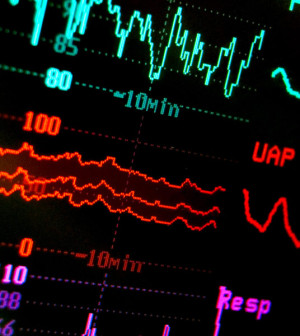- Could Your Grocery Store Meat Be Causing Recurring UTIs?
- Are You Making This Expensive Thermostat Error This Winter?
- Recognizing the Signs of Hypothyroidism
- 10 Strategies to Overcome Insomnia
- Could Artificial Sweeteners Be Aging the Brain Faster?
- Techniques for Soothing Your Nervous System
- Does the Water in Your House Smell Funny? Here’s Why
- Can a Daily Dose of Apple Cider Vinegar Actually Aid Weight Loss?
- 6 Health Beverages That Can Actually Spike Your Blood Sugar
- Treatment Options for Social Anxiety Disorder
Debbie Reynold’s Death Puts Spotlight on ‘Broken Heart Syndrome’

A stroke claimed the life of actress Debbie Reynolds, 84, on Wednesday — just a day after her daughter Carrie Fisher died from a heart attack.
Reynold’s son, Todd Fisher, told the Associated Press that the stress of losing her daughter may have been a contributing factor in his mother’s death.
Now, doctors familiar with such cases agree that so-called “broken heart syndrome” might have played a role.
“Lots of times I hear a causal mention of someone dying of a ‘broken heart,’ but what many don’t know is that ‘broken heart syndrome’ is a real medical condition,” said Dr. Matthew Lorber, a psychiatrist at Lenox Hill Hospital in New York City.
Lorber wasn’t on Reynolds’ medical team, but he said the syndrome is a familiar one for many physicians.
“Broken heart syndrome refers to the consequences of the heart being exposed to a surge of stress hormones triggered by a major stressor,” he explained. “It is most commonly seen in women 50 or older.”
“When the stress hormones hit the heart it can cause arrhythmias [a temporary irregular heart rate], angina [severe chest pain], shortness of breath and intense changes in blood pressure,” Lorber said.
For most people in the midst of a personal crisis, including a sudden bereavement, these heart conditions are temporary. Most will “have a full recovery without any permanent damage,” Lorber said. But the effect in a minority of cases may be more severe.
According to the AP, Reynold’s son confirmed that his mother died from a stroke after being taken to Cedars-Sinai Medical Center in Los Angeles.
“She’s now with Carrie, and we’re all heartbroken,” Todd Fisher told the news agency. He added that he believes the stress of his sister’s death “was too much” for his mother.
Carrie Fisher, best known for her iconic role as Princess Leia in the “Star Wars” movies, died Tuesday after suffering a heart attack last week on a flight from London to Los Angeles. She was 60.
On Tuesday, Reynolds had expressed gratitude to her daughter’s fans on Facebook.
“Thank you to everyone who has embraced the gifts and talents of my beloved and amazing daughter. I am grateful for your thoughts and prayers that are now guiding her to her next stop,” Reynolds had written.
Reynolds was best known for her roles in films produced in the 1950s and ’60s, which included “Tammy” and “Singing in the Rain.” She received an Oscar nomination for her starring role in the 1964 film “The Unsinkable Molly Brown.”
Carrie Fisher was the daughter of Reynolds and singer Eddie Fisher. Their marriage ended when Carrie was 2, after Fisher left Reynolds for actress Elizabeth Taylor.
Sudden grief and other life crises don’t have to endanger your heart health, another physician added.
Dr. Scott Krakower is a psychiatrist at Zucker Hillside Hospital in New Hyde Park, N.Y. He said that “if you suspect that you are at risk for this syndrome, you should see a medical doctor as soon as possible.”
Also, “it is important to grieve appropriately and use anxiety/stress reduction techniques during this time,” Krakower said. “These techniques may include deep breathing, self-soothing and utilizing mindfulness. It is important to stay on a routine, remembering to eat, and get adequate sleep.”
More information
Find out more about women’s heart health at the American Heart Association.
Source: HealthDay
Copyright © 2026 HealthDay. All rights reserved.










